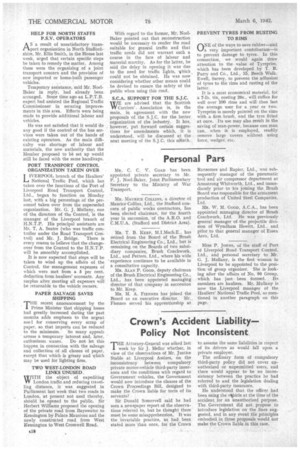HELP FOR NORTH STAFFS P.S.V. OPERATORS
Page 20

If you've noticed an error in this article please click here to report it so we can fix it.
AS a result of unsatisfactory transport organization in North Staffordshire, Mr. Ellis Smith, in the House last week, urged that certain specific steps be taken to remedy the matter. Among these were the organizing of a joint transport concern and the provision of new imported or home-built passenger vehicles.
Temporary assistance, said Mr. NoelBaker in reply, had already been arranged. Some time ago an L.P.T.B. expert had assisted the Regional Traffic Commissioner in securing improvements in this area. Efforts were being made to provide additional labour and vehicles.
He was not satisfied that it would do any good if the control of the bus services were taken out of the hands of existing operators. As the main difficulty was shortage of labour and materials, the new authority that the Member proposed to be set up would still be faced with the same handicaps.
PORT TRANSPORT CONTROL ORGANIZATION TAKEN OVER
LIVERPOOL branch of the Hauliers' National Traffic Pool, which has taken over the functions of the Port of Liverpool Road Transport Control, Ltd., began to function on Monday last, with a big percentage of the personnel taken over from the superseded organization. Mr. G. J. Mullany, one of the directors of the Control, is the manager of the Liverpool branch of H.N.T.P. His principal assistants are Mr. T. A. Seatre (who was traffic controller under the Road Transport Con trol) and Mr. J. Bridge. There is every reason to believe that the changeover from the Control to the H.N.T.P. will be smoothly accomplished.
It is now expected that steps will be taken to wind up the affairs of. the Control, the management expenses of which were met from a 5 per cent. deduction from hauliers' accounts. Any surplus after meeting all expenses will be returnable to the vehicle owners.
PAPER SALVAGE SAVES SHIPPING
THE recent announcement by the Prime Minister that shipping losses had greatly increased during the past months adds emphasis to the urgent need for conserving every scrap of paper, so that iniports can be reduced to the minimum. So many appeals arouse a temporary interest and, later,
enthusiasm wanes. Do not let this happen in connection with the salvage and collection of. all classes of paper, except that which is greasy and vhich may be used for lighting fires.
TWO WEST-LONDON ROAD LINKS UNUSED.
WITH the object of expediting
London traffic and reducing travelling distance, it was suggested in Parliament last week that two roads in London, at present not used thereby, should be opened to the public. Sir Herbert Williams proposed the opening of the private road from Bayswater to Kensington by Palace Mansions and the newly constructed road from West Kensington to West Cromwell Road.
With regard to the former, Mr. NoelBaker pointed out that reconstruction would be necessary to render the road suitable for general traffic and that traffic needs did not warrant such a course in the face of labour and material scarcity. As for the latter, he said the delay in opening it was due to the need for traffic lights, which . could not be obtained. He was now considering whether other means could be devised to ensure the safety of the public when using this road.
S.C.A. SUPPORT FOR THE S.J.C.
Ware advised that the Scottish orriers' Association is, in the main, in agreement with the new proposals of the S.J.C. for the better organization of the industry. It has, however, put forward certain suggestions for amendments which, it is understood, will be discussed at the next meeting of the S.J.C. this ninth.
PREVENT TYRES FROM RUSTING TO RIMS
ONE of the ways to save rubber—and a very important contribution—is to prevent damage to tyres. In this connection, we would again draw attention to the value of Tyreprim; which has been developed by T. R. Parry and Co., Ltd., 15, Beech Walk, Ewell, Surrey, to prevent the adhesion of tyres to the rims and rusting of the latter.
It is a most economical material, for a 7-lb. tin, costing 265., will suffice for well over 100 rims and will thus last the average user for a year or two. Tyreprim is merely painted on the rims with a firm brush, and the tyre fitted at once. Its use may also result in the saving of man-power, because one man can, when it is employed, readily remove large covers without using force, wedges', etc.




















































